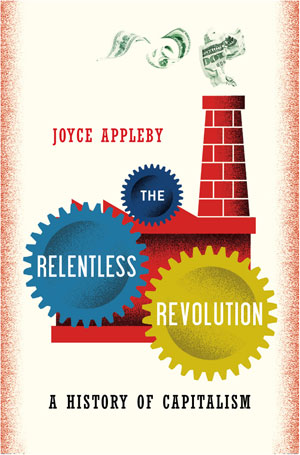
The Relentless Revolution begins with the puzzle of why it took so long for capitalism to emerge. Defining capitalism as a cultural system based on a particular economy, I show that capitalism was never just an economic system. Its focus on enhancing production through private initiatives impinged on every facet of life and was itself affected by every institution that shaped its participants.
Capitalism created new cultural forms, stimulated new tastes, and introduced a whole new vocabulary for discussing the impact of private enterprise on the welfare of the society as a whole. In time, traditional ways of acting and thinking lost their controlling power.
Neither inevitable nor predictable, capitalism began with a few innovations. In 17th century England, new ways to produce food made possible reducing the number of men and women required to feed the society. Capital too was released for investments in things like the steam engines that were revolutionizing mining and manufacturing. The new science promoted an unending succession of technological advances. Over the next century the percentage of population devoted to farming dropped from around 80% to 40%. This was a first in world history.
Once capitalism’s amazing power to generate wealth was detected, most countries, at least in the West, wanted part of the action. In the 18th century, it was relatively easy for other countries to copy English innovations. The United States and Germany overtook England by the end of the 19th century.
Following the trajectory of capitalist expansion, The Relentless Revolution shows why capitalism is a cultural system. Where commerce could live within the interstices of society with its customary mores and aristocratic habits, the capitalist system forced widespread social and political change because its momentum involved more and more of society’s population. For this reason, there are in today’s world many variants of capitalist culture as different nations align economic restructuring with the basic qualities of their people.
“There is also imbedded in economic theory a notion of human beings as constantly striving to maximize their benefits in economic transactions. This stripped down view of human nature makes universally applicable what is actually conditional and contingent.”
A history does more than narrate events—it also reveals the decisive moments that give shape to a life or country. It permits consideration of turning points and alternative directions for the course of action. This is particularly the case with capitalism whose roots have been obscured.
Economists analyze capitalism with mathematical precision, but their models screen out the messiness in economic relations. Without studying the market’s entanglement with society and culture, we have difficulty penetrating the logic of capitalism. There is also imbedded in economic theory a notion of human beings as constantly striving to maximize their benefits in economic transactions. This stripped down view of human nature makes universally applicable what is actually conditional and contingent.
As the 2008 meltdown in the centers of finance demonstrated, the human element in markets is much more problematic. Risky behavior is integral to decision-making in the market. When capitalism is approached historically instead of analytically a fuller account of its inner workings emerges.
Joseph Schumpeter, an Austrian economist, captured the dynamic in capitalism with the telling phrase “creative destruction.” While the creative side has brought the world a succession of wonderful inventions, the destruction has torn up whole communities and ways of life, and continues to do so. The job of monitoring, guiding, and regulating the complexities of our global economy depends on our having an inclusive picture of the economic system that lies at the base of our culture. Public debates that either demonize or idealize capitalism frustrate sound policies.
The history of the homelands of capitalism has too often been tied up with invidious comparison with nonwestern countries. Scholars have distinguished the “rest of the World” from the West in unflattering ways. In part this is because the prosperity that capitalism ushered in was closely associated with the heroic story of securing political freedom and participatory government in Western Europe and the United States. Modernity, in these accounts, has been contrasted not only with premodern Europe but with contemporary “backward” societies as well. The notion of backwardness assumed that history was the story of progress.
The pervasiveness of human inventiveness demonstrates that no country, race, or continent has a lock on it. The Arabs and Chinese made critical advances in sciences long before Europeans. They also developed complicated hydraulic systems. In sub-Saharan African craftsmen skillfully mined and made artifacts in gold, copper, tin, and iron. Pre-Columbian Mayans, Incans, and Aztecs constructed impressive buildings without the benefit of iron or wheels. All developed rich and complicated cultures. What they didn’t do was focus upon innovations that would improve their productivity. It was not superior intelligence that led to the Industrial Revolution in England, but rather the propitious linkage of technological curiosity to economic opportunities within a society that offered incentives to those who could improve production processes.
Copying capitalist practices proved a necessity for England’s European rivals. The rest of the world took a more circuitous route to the market economy. Changes that came gradually to England arrived abruptly for its neighbors across the Channel. Men and women who had been a part of a settled agrarian way of life were quickly drawn into a new proletariat. Factories became scenes of oppressive labor conditions, provoking reform movements and hostile analyses of capitalism. In Russia, revolutionaries installed a communist regime in the early 20th century. Instead of a market economy, communist nations instituted a command economy with government officials in charge.
Because material advantages enhanced military prowess, European nations began to invade the countries of Africa and Asia to exploit their resources and labor. By the end of the 19th century few peoples in world remained untouched by the West’s intense application of money and workers to produce more goods. These imperialist impositions of power provoked strong reactions, particularly after World War II when colonial subjects rebelled and formed independent countries of their own. Throughout the 20th century, the sustained success of capitalism to generate great wealth lured a succession of nations to replace their traditional or socialist economies with private enterprise and open markets. This globalization has brought a new round of “creative destruction.”
My own curiosity about capitalism began with a question about changing conceptions of human nature. In the beginning of the 17th century human beings were depicted in sermons and literature as fickle, impulsive, and prone to self-destructive behavior. Yet at the end, English writers started talking about the predictability of people’s actions in their market relations. Soon this economic definition became the dominant one.
Wanting to find out how this fundamental transformation of the understanding of human nature took place, I read the hundreds of pamphlets, broadsides, and books examining England’s expanding market relations. I discovered where the new definition of human nature came in and learned how central to capitalism are the ways people have analyzed their economy—first in puzzled awe, then in critical assessment, and finally through the expertise of specialists.
I’d like my fresh reader to read the introduction carefully because it lays out my argument and makes the assertions that the text must back up. Many believe that capitalism was an inevitable development and that it had deep roots in European intellectual soil. In my introduction I explain why I don’t think that either is true. I would like my reader to give careful attention to how the Four Little Tigers of South Korea, Taiwan, Singapore, and Hong Kong became important players in the world market, for their differences underscore my point that capitalism takes different shape in different countries because it is a culture and cultures encompass family mores, religion, politics, and personal values.
“Capitalism may be a relentless revolution, but it is not a mindless one.”
Capitalism has also been treated as though it were a natural system like aerodynamics with its own laws. The argument against this view runs through The Relentless Revolution. Knowing the fascinating history of how capitalism emerged within a traditional society and succeeded in challenging venerable orders throughout the world, I would hope, would open people to new ways of thinking about their economy.
Capitalism may be a relentless revolution, but it is not a mindless one. Pervasive poverty, global warming, failed states, and oppressive governments still present problems for the world. The wealth-generating capacity of capitalism can help meet all of these challenges. But, first, we must understand it.


Joyce Appleby is a professor emerita of UCLA where she taught American history for 20 years. Her abiding interest has been in analyzing the changing social theories about human nature, politics and economic development that accompanied the modern transformation of Europe and America. She is a past president of the American Historical Association, the Organization of American Historians, and the Society for the History of the Early Republic, and is currently co-director of the History News Service, an informal syndicate of professional historians who write newspaper op-ed essays that put contemporary issues in their historical context. Her most recent publications are Inheriting the Revolution: The First Generation of Americans (2000), Jefferson (2003), a collection of addresses and essays titled A Restless Past: History and the American Public (2004), and The Relentless Revolution: A History of Capitalism (2010).